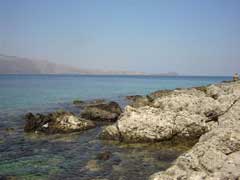 Climate Change Takes Central Focus in Nile Basin
Climate Change Takes Central Focus in Nile Basin
The nine countries sharing the Nile Basin may have specific variations in cultures, policies, and institutional frameworks, but climate change continues to be a cross-cutting factor impacting their socio-economic livelihoods – whether agriculture, energy production, mining safety, or water quantity and quality.
The 2nd High-Level Regional Policy Workshop focusing on "Adapting to Climate Change Induced Water Stress in the Nile River Basin," on 5 April 2013, in Kigali, Rwanda, aimed at validating the Climate Change Resilience Status Reports recommending keeping momentum toward adopting climate change resilient practices to reduce water stress in the Nile Basin.
Nile Basin Countries and Climate Change
Common characteristic of these countries is unpredictable seasons, persistent droughts, torrential rains followed by destructive floods, and continuous population movements in search of water.
Workshop participants from nine Nile Basin countries, eight GWP Country Water Partnerships, government institutions, GWP Eastern Africa Partners, the Nile Basin Initiative (NBI), researchers, academics, and media institutions emphasised the need to increase awareness at both national and local levels.
The workshop was organised as part of the “Adapting to Climate Change Induced Water Stress in Nile River Basin Project”, which GWP Eastern Africa implements with a consortium of partners: the Nile Basin Initiative, Danish Hydraulic Institute, United Nations Environmental Program (UNEP). The project, funded by SIDA and Coordinated by UNEP, seeks to increase the technical capacity of regional and national centers of excellence and research centers to support the adaptation actions of countries and communities.
Regional Cooperation
Officiating at the workshop, the representative from the Rwanda Natural Resources Ministry, Ms Lyliose Umupfasoni, Director for Environment, Water Resources and Forests, hailed the “existing regional cooperation in addressing shared challenges by managing transboundary water resources and adapting to the impacts of climate change. Partnering with GWP Eastern Africa helps in addressing some of the gaps in adapting to climate change, policy making, decision making and to adjust existing policies.”
The goal of the project is to build resilience of ecosystem and economies that are most vulnerable to climate change induced water stress in the Nile Basin Countries. The Nile Delta Region (Egypt), the Ethiopian highlands, Mount Elgon (Kenya) and Toska Depression were some of the identified hotspot areas of climate change areas needing focused attention.
Implementing the Project
Among other implementing partners, GWP Eastern Africa’s role in the implementation of the project is to provide institutional and policy support to countries in the Nile Basin Region. GWP Eastern Africa is responsible for:
- providing technical input to Integrated Water Resources Management (IWRM) options to basin-wide climate change adaptation planning and ensure linkages with national planning;
- conducting high-level regional policy roundtable to prioritize technical, financial and policy options for adaptation at basin levels;
- carrying out assessment of different IWRM options for resilience and their policy implications for the major sectors in Nile basin countries;
- conducting trainings, information management and dissemination through climate change adaptation portal and awareness materials.
| Contact information | n/a |
|---|---|
| News type | Inbrief |
| File link |
http://allafrica.com/stories/201304080640.html |
| Source of information | GWP |
| Subject(s) | METHTODOLOGY - STATISTICS - DECISION AID , NATURAL MEDIUM , RISKS AND CLIMATOLOGY , WATER DEMAND |
| Geographical coverage | Egypt, Sudan, Kenya, Ethiopia |
| News date | 23/04/2013 |
| Working language(s) | ENGLISH |
 you are not logged in
you are not logged in





